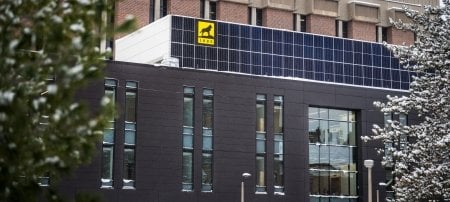University Board of Trustees approves expenditures for planning and design of H-STEM Complex.
At its regular meeting in Houghton today, the Michigan Technological University Board of Trustees approved expenditures to complete planning and design for what is currently being referred to as the H-STEM Engineering and Health Technologies Complex (or H-STEM Complex). Expenditures for planning and design are not to exceed $3.1 million.
In late 2018, the Michigan Legislature granted planning authorization for the H-STEM Complex, a $44.7 million capital outlay project that will comprise to-be-constructed shared and flexible lab spaces co-located with renovated classrooms and learning spaces in the Chemical Sciences and Engineering Building. The project request included a proposed $29.7 million in State support, with $15 million in matching funds.
Connecting with Communities
Associate Professor Richelle Winkler presented the Board with an overview of her solar-related research in two Upper Peninsula towns. Winkler, her colleagues and students, and local community members have been investigating the feasibility of establishing a community solar project in L’Anse and Baraga. Community investors would own the solar panels, sell energy to the grid and earn money in the form of credits on their energy bills.
"This project uses a community engaged, participatory research approach to bring together expertise from across the University, in collaboration with communities and industry, to address an important sustainability issue in our region."
Winkler described their success thus far — L’Anse issued a request for proposals and is currently pre-selling solar panels — and noted that the project has far-reaching outcomes. It equips students with practical experience in an emerging industry; provides community members in L’Anse and Baraga with access to affordable, renewable, local energy; engages the University with local communities; and strengthens Michigan Tech’s reputation as a leader in transdisciplinary energy research.
“Community solar has the potential to make positive impacts environmentally, economically and for local community development," Winkler said. "It has been particularly rewarding to see Michigan Tech students engaging with diverse community members and getting practice applying their skills to meet community needs.”
In other business, the Board:
- Welcomed new Board members John U. Bacon and Jeffrey C. Littmann
- Recognized Roberta Dessellier and Donald Wareham for their many years of service to the University
- Approved a resolution that excludes Trustees from having access to classified information unless they are members of the Executive Committee
- Approved a revision to Board Policy regarding building and property rules and regulations
Michigan Technological University is an R1 public research university founded in 1885 in Houghton, and is home to nearly 7,500 students from more than 60 countries around the world. Consistently ranked among the best universities in the country for return on investment, Michigan's flagship technological university offers more than 120 undergraduate and graduate degree programs in science and technology, engineering, computing, forestry, business, health professions, humanities, mathematics, social sciences, and the arts. The rural campus is situated just miles from Lake Superior in Michigan's Upper Peninsula, offering year-round opportunities for outdoor adventure.






Comments